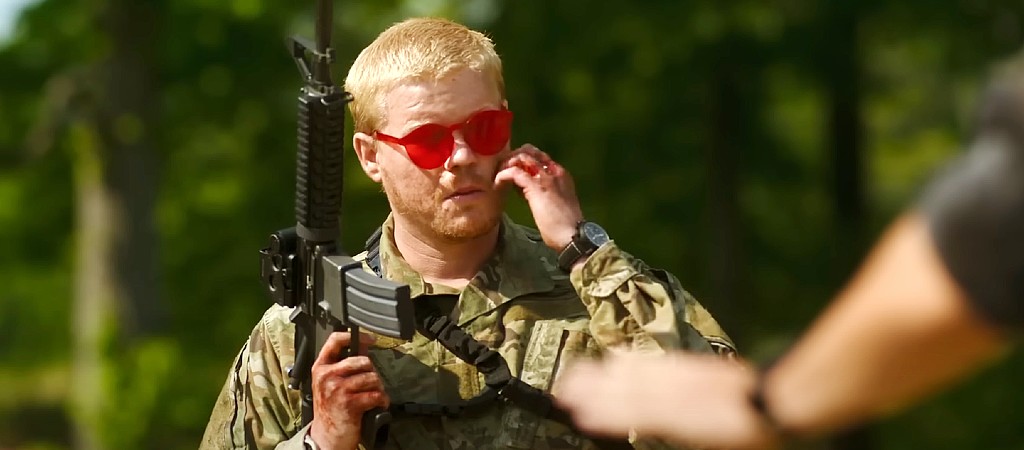When the first trailer dropped for Civil War, the latest film from Ex Machina and Men director Alex Garland, there were a lot of jokes about the seemingly ridiculous premise that California and Texas would ever band together to fight the United States government. Would you believe Garland pulled it off?
As the early reviews pile in after Civil War made its SXSW premiere, one thing has become abundantly clear: The film is not at all what people are expecting.
Civil War is focused less on how its titular conflict broke out and more on how a group of journalists engage with the reality of a modern-day war breaking out on American soil. Thanks to some visceral scenes that builds to a massive action sequence in the nation’s capital, the experience of Civil War surprisingly works.
You can see what the critics are saying below:
Lovia Gyarkye, The Hollywood Reporter:
With the precision and length of its violent battle sequences, it’s clear Civil War operates as a clarion call. Garland wrote the film in 2020 as he watched cogs on America’s self-mythologizing exceptionalist machine turn, propelling the nation into a nightmare. With this latest film, he sounds the alarm, wondering less about how a country walks blindly into its own destruction and more about what happens when it does.
Peter Debruge, Variety:
Intended as a wake-up call, the long-fuse thriller — which starts slow and snowballs to a jaw-dropping raid on Washington, D.C. — embeds viewers alongside a dedicated team of journalists making their way to the Capitol while the country unravels around them. It’s the most upsetting dystopian vision yet from the sci-fi brain that killed off all of London for the zombie uprising depicted in “28 Days Later,” and one that can’t be easily consumed as entertainment. A provocative shock to the system, “Civil War” is designed to be divisive.
David Fear, Rolling Stone:
Alex Garland’s Civil War faces this what-if concept head on, imagining a future so very not-so-distant that you might accidentally mistake it for the present, in which the USA is once more at war against itself. The premise is a perfect opportunity to take a cold, hard, genre-inflected look at the American experiment’s current slouching toward self-destruction — the only question is whether Garland’s wild potboiler wants to explore or exploit our state of the nation, and the jury’s still out on that.
Tasha Robinson, Polygon:
It’s almost perverse how little Civil War reveals about the sides of the central conflict, or the causes or crises that led to war. (Viewers who show up expecting an action movie that confirms their own political biases and demonizes their opponents are going to leave especially confused about what they just watched.) This isn’t a story about the causes or strategies of American civil war: It’s a personal story about the hows and whys of war journalism — and how the field changes for someone covering a war in their homeland instead of on foreign turf.
Katie Rife, IndieWire:
In real life, America is growing crueler and more divided by the day, and the social fabric of the country is disintegrating along with its infrastructure. But “Civil War” isn’t a plea for empathy, or even civility. It simply follows this trend to its logical end point, which is a country where militiamen with automatic weapons shoot strangers on sight and torture their old high school classmates in the burned-out shells of abandoned car washes. Everyone who isn’t directly affected by the violence pretends it isn’t happening, in the name of “stay[ing] out” of politics — a stance that the film condemns more strongly than any.
Matt Zoller Seitz, RogerEbert.com:
The movie is about journalists whose own country is cratering but who keep chasing the story and are determined to catch it even if it kills them. Would they have embedded themselves with Hitler’s army if they’d somehow survived behind enemy lines in Germany in the 1940s and been given the opportunity? I wouldn’t rule it out. They will probably come across as unlikable, or at least off-putting, to most viewers—the New York Times and other supposedly “neutral” mainstream outlets have come under fire in recent years for seeming to give the rise of American fascism the “both sides” treatment, and when their reporters are called out, they often say that their only duty is to tell the story. Certain members of certain professions have that code. Other members disagree. Both factions are represented in “Civil War,” but in a fictionalized context that asks “Is the storyteller’s highest obligation to tell what happened or choose a side?” and then lets the audience fight over the answer.
Civil War breaks out in theaters on April 12.







